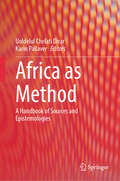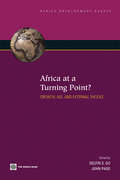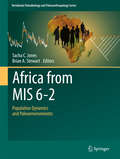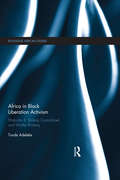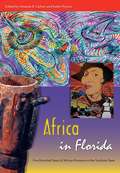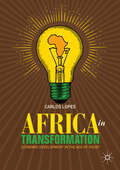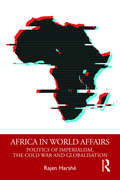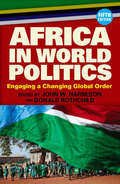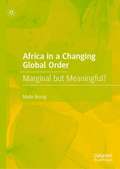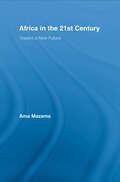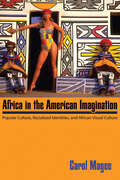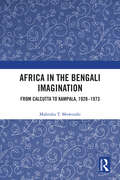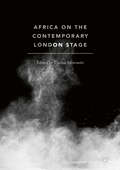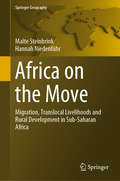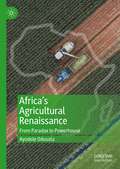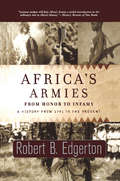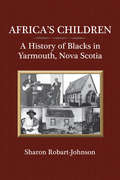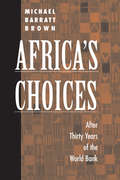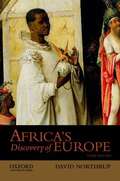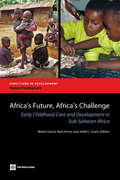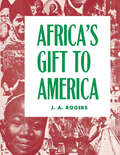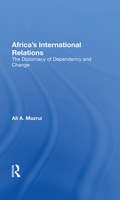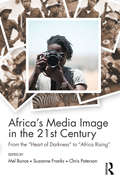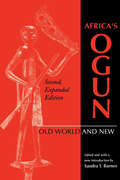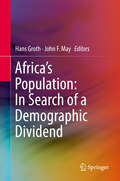- Table View
- List View
Africa as Method: A Handbook of Sources and Epistemologies
by Karin Pallaver Uoldelul Chelati DirarThis methods handbook investigates the multiple sources and interdisciplinary methodologies employed by scholars working on Africa. It illuminates how scholars of Africa locate, select, interpret, and combine sources to reconstruct Africa’s past. Each contributor presents a specific typology of source or body of sources. Focusing on specific case studies, the chapters offer a broad overview of the methods and sources employed by historians, anthropologists, linguists, and related disciplines in the humanities and social sciences, working on Africa. The topics covered are diverse and include the significance of oral sources and how they relate to written sources; the perspectives provided by female writings on and from Africa; the relevance of Islamic court records for the study of Africa; the use of songs and poetry for the understanding of contemporary political protests; the employment of photographs and other visual sources for the study of the African past; how new sources or new interpretations of existing ones can provide different historical periodization; and finally, how biographies and autobiographies, including personal experiences with fieldwork in Africa, can contribute to shed light on Africa’s past. The book is a valuable resource for graduate students and academics interested in doing research on Africa. It provides a sweeping but rich understanding of the methodologies in the field of African studies, and for historians in general. Ultimately, this book contends that the specific methodologies developed for the study of Africa are relevant not only for the understanding of the continent itself, but can also contribute significantly to the historical method more widely.
Africa at a Turning Point? Growth, Aid, and External Shocks
by John Page Delfin Sia GoSince the mid-1990s, sub-Saharan Africa has experienced an acceleration of economic growth that has produced rising incomes and faster human development. However, this growth contrasts with the continent's experience between 1975 and 1995, when it largely missed out on two decades of economic progress. This disparity between Africa's current experience and its history raises questions about the continent's development. Is there a turnaround in Africa's economy? Will growth persist? 'Africa at a Turning Point?' is a collection of essays that analyzes three interrelated aspects of Africa's recent revival. The first set of essays examines Africa's recent growth in the context of its history of growth accelerations and collapses. It seeks to answer such questions as, is Africa at a turning point? Are the economic fundamentals finally pointing toward more sustainable growth? The second set of essays looks at donor flows, which play a large role in Africa's growth. These essays focus on such issues as the management and delivery of increased aid, and the history and volatility of donor flows to Africa. The third set of essays considers the recent impact of one persistent threat to sustained growth in Africa: commodity price shocks, particularly those resulting from fluctuations in oil prices.
Africa from MIS 6-2: Population Dynamics and Paleoenvironments (Vertebrate Paleobiology and Paleoanthropology)
by Sacha C. Jones Brian A. StewartBringing together archaeological, paleoenvironmental, paleontological and genetic data, this book makes a first attempt to reconstruct African population histories from out species' evolution to the Holocene. Africa during Marine Isotope Stages (MIS) 6 to 2 (~190-12,000 years ago) witnessed the biological development and behavioral florescence of our species. Modern human population dynamics, which involved multiple population expansions, dispersals, contractions and extinctions, played a central role in our species' evolutionary trajectory. So far, the demographic processes - modern human population sizes, distributions and movements - that occurred within Africa during this critical period have been consistently under-addressed. The authors of this volume aim at (1) examining the impact of this glacial-interglacial- glacial cycle on human group sizes, movements and distributions throughout Africa; (2) investigating the macro- and micro-evolutionary processes underpinning our species' anatomical and behavioral evolution; and (3) setting an agenda whereby Africa can benefit from, and eventually contribute to, the increasingly sophisticated theoretical and methodological palaeodemographic frameworks developed on other continents.
Africa in Black Liberation Activism: Malcolm X, Stokely Carmichael and Walter Rodney (Routledge African Studies)
by Tunde AdelekeThis book revisits and analyzes three of the most accomplished twentieth century Black Diaspora activists: Malcolm X (1925–1965), Stokely Carmichael (1941–1998) and Walter Rodney (1942–1980). All three began their careers in the Diaspora and later turned toward Africa. This became the foundation for developing and solidifying a global force that would advance the struggles of Africans and people of African descent in the Diaspora. Adeleke engages and explores this “African-centered” discourse of resistance which informed the collective struggles of these three men. The book illuminates shared and unifying attributes as well as differences, presenting these men as unified by a continuum of struggle against, and resistance to, shared historical and cultural challenges that transcended geographical spaces and historical times. Africa in Black Liberation Activism will be of interest to scholars and students of African-American history, African Studies and the African Diaspora.
Africa in Florida: Five Hundred Years of African Presence in the Sunshine State
by Amanda B. Carlson Robin Poynor"An inspiring, original, and significant work that takes our notions of 'diaspora' to exciting places and offers new and thoughtful data on the presence and impact of 'Africa' in Florida history, lives, and objects. Africa in Florida is an important contribution to American history and to the continuing and transforming histories of African diasporas and Africa itself. "--Henry John Drewal, editor of Sacred Waters "Fascinating. Indispensable. With contributions by excellent scholars in the field of African and African diaspora studies and cultural studies, the volume provides diverse meanings and interpretations of contacts among Africans from the continent, Europeans, and indigenous people of Florida that resulted in works of creative arts, language, music, and food. "--Jacob K. Olupona, author of City of 201 Gods Over the course of centuries, immigrants from numerous countries in contemporary Africa have influenced the Sunshine State's history and culture. Through a critical evaluation of the influences and effects of the numerous African and African-influenced cultures that have been a part of the state's history, this collection of essays and art explores how Florida both shapes and is shaped by the multiple African diasporas that move through it. Africa in Florida challenges the way American history and southern studies have characterized African contributions to the development of the United States by showing how Africans, both free and enslaved, asserted themselves as explorers, farmers, slave owners, artists, and more.
Africa in Transformation: Economic Development in the Age of Doubt
by Carlos Lopes“Lopes brings his rigour, insight, and experience to this timely new book, presenting a compelling rethink of traditional development models in Africa and the need to seize on transformational change to build a sustainable future for the continent."—Kofi Annan, former United Nations Secretary General “Some readers will enjoy Lopes’ eclectic brilliance and breath-taking culture. Others will salute his ability to bring compelling new angles to every topic. Everyone will be impressed with his craftsmanship, his rich and multi-faceted approach to development, and his high ethical standards. It is impossible to read this jewel book and not feel smarter.”—Célestin Monga, African Development Bank’s Vice President and Chief Economist “Drawing on his distinguished academic career, policy experience at the highest level, and deep love of the continent, Lopes provides a visionary analysis of Africa's current problems and future prospects. This book provides a highly unusual combination of intellectualism and hard-nosed pragmatism. A singular achievement.” —Ha-Joon Chang, University of Cambridge, UK“Thorough, thought-provoking, and beyond rhetoric: definitely a must-read for anyone who wants to understand Africa’s present and future.”—Enrico Letta, former Prime Minister of Italy, Dean of the Paris School of International Affairs, Sciences Po, France Lopes delivers an overview of the critical development issues facing the African continent today. He offers readers a blueprint of policies to address issues, and an intense, heartfelt meditation on the meaning of economic development in the age of democratic doubts, identity crises, global fears and threatening issues of sustainability.
Africa in World Affairs: Politics of Imperialism, the Cold War and Globalisation
by Rajen HarshéAfrica finds itself at the centre stage of world politics in the twenty-first century. To truly determine its rising influence and role in world affairs would mean unravelling the politics of imperialism, the Cold War and globalisation. Going beyond Euro-American perspectives, this book presents a comprehensive study of Africa and its role in world politics. Africa in World Affairs: • Closely examines the transition of Africa in its colonial and post-colonial phases; • Explores the intellectual history of modern Africa through liberation struggles, social movements, leaders and thinkers; • Investigates the continent’s relationships with former colonial powers such as Britain, France and Portugal; untangles complexities of French neo-colonialism and sheds light on the role of the superpower, such as the USA and major and rising powers like China and India; • Highlights complex and wide-ranging diversities of the region, and the ways in which it continues to negotiate with issues of modernity, racism and globalisation. A core text on Africa and the world, this book will be indispensable for students of African studies, politics and international relations, and history. It will also be a must-read for policymakers, diplomats and government think tanks.
Africa in World Politics
by Donald Rothchild John W HarbesonIn this fully revised edition top scholars in African politics address the effects that major currents in Africa and world politics have upon each other and explore the ramifications of this interconnection for contemporary theories of international and comparative politics.The fifth edition focuses on engaging a changing world order. The nation-state as we know it is a legacy of European rule in Africa, and the primacy of the nation-state remains the bedrock of most contemporary theories of international relations. Yet in the fifth decade of Africa's independence, this colonial inheritance has been challenged as never before by state weakness, internal and inter-state conflict, new gains in economic development, large investments by China and other G-20 countries, and internal and external demands for economic and political reform, with potentially far-reaching implications. Including six new chapters on warfare, bilateral vs. multilateral peacekeeping, Sudan, the Great Lakes Crisis, and China and Africa, this text remains an invaluable resource for students of African and world politics.
Africa in a Changing Global Order: Marginal but Meaningful?
by Malte BrosigThis book focuses on marginal actors in the global order. Such a perspective is often missing as global order analysis is often biased towards exploring large powerful actors and equating their relations with global order. Such an approach is not only dated but also analytically incomplete. It is because of the increasingly decentred nature of global order, that marginal actors and their relations, tactics, strategies and approaches matter for global order as they matter for these actors. The book starts by providing an analytical framework exploring different policy options for African agency which are located along a nexus of choices ranging from accommodation, engagement to system transformation. The selection of a particular interaction type is argued to be dependent on external opportunity structures in the form of different global orders reaching from competitive polarity to dispersed forms of authority or even non-polarity. In addition to these external conditions, the ability to generate meaningful African agency facilitates a greater role in global order. Empirically, the book covers four policy fields which are peace and security, international criminal justice, economics and trade and COVID-19.
Africa in the 21st Century: Toward a New Future (African Studies)
by Ama MazamaAfrica in the 21st Century: Toward a New Future brings together some of the finest Pan African and Afrocentric intellectuals to discuss the possibilities of a new future where the continent claims its own agency in response to the economic, social, political, and cultural problems which are found in every nation. The volume is structured around four sections: I. African Unity and Consciousness: Assets and Challenges; II. Language, Information, and Education; III. African Women, Children and Families; and IV. Political and Economic Future of the African World. In original essays, the authors raise the level of discourse around the questions of integration, pluralism, families, a federative state, and good governance. Each writer sees in the continent the potential for greatness and therefore articulates a theoretical and philosophical approach to Africa that constructs a victorious consciousness from hard concrete facts. This book will interest students and scholars of the history and politics of Africa as well as professional Africanists, Africologists, and international studies scholars who are inclined toward Africa.
Africa in the American Imagination: Popular Culture, Racialized Identities, and African Visual Culture
by Carol MageeIn the American world, the presence of African culture is sometimes fully embodied and sometimes leaves only a trace. Africa in the American Imagination: Popular Culture, Racialized Identities, and African Visual Culture explores this presence, examining Mattel's world of Barbie, the 1996 Sports Illustrated swimsuit issue, and Disney World, each of which repackages African visual culture for consumers. Because these cultural icons permeate American life, they represent the broader U.S. culture and its relationship to African culture. This study integrates approaches from art history and visual culture studies with those from culture, race, and popular culture studies to analyze this interchange. Two major threads weave throughout. One analyzes how the presentation of African visual culture in these popular culture forms conceptualizes Africa for the American public. The other investigates the way the uses of African visual culture focuses America's own self-awareness, particularly around black and white racialized identities. In exploring the multiple meanings that “Africa” has in American popular culture, Africa in the American Imagination argues that these cultural products embody multiple perspectives and speak to various sociopolitical contexts: the Cold War, civil rights, and contemporary eras of the United States; the apartheid and post-apartheid eras of South Africa; the colonial and postcolonial eras of Ghana; and the European era of African colonization.
Africa in the Bengali Imagination: From Calcutta to Kampala, 1928-1973
by Mahruba T. MowtushiThis book examines textual representations of Africa in the Indian imagination from 1928 to 1973. It critically analyses Bengali literature during this period, their imitation of colonial racial prejudices and how it allowed Bengalis to fashion their identity. It analyses the development of ‘Africa’ as an idea and historical reality through the writings of five Bengali writers including the Bengali novelist Bibhutibhushan Bandyopadhyay, the children’s author Hemendra Kumar Roy, the poet and philosopher Rabindranath Tagore, the playwright Ganesh Bagchi and the surrealist poet and founding editor of Transition magazine Rajat Neogy. The book shows how these writers engage with the idea of Africa and their influence in the construction of the Bengali cultural identity during the freedom struggle, the Partition of Bengal in 1947 and the creation of Bangladesh in 1971. The book offers readers a glimpse of the exotic imaginary locales of Africa while offering an in-depth look into the interconnected histories, cartographic routes and cultural exchange between India and Africa. A first of its kind, this book will be an excellent read for students and scholars of literature, comparative literature, history, cultural studies, postcolonial studies, South Asian studies, African studies and diaspora studies. .
Africa on the Contemporary London Stage
by Tiziana MorosettiThis collection of essays investigates the way Africa has been portrayed on the London stage from the 1950s to the present. It focuses on whether — and, if so, to what extent — the Africa that emerges from the London scene is subject to stereotype, and/or in which ways the reception of audiences and critics have contributed to an understanding of the continent and its arts. The collection, divided into two parts, brings together well-established academics and emerging scholars, as well as playwrights, directors and performers currently active in London. With a focus on Wole Soyinka, Athol Fugard, Bola Agbaje, Biyi Bandele, and Dipo Agboluaje, amongst others, the volume examines the work of key companies such as Tiata Fahodzi and Talawa, as well as newer companies Two Gents, Iroko Theatre and Spora Stories. Interviews with Rotimi Babatunde, Ade Solanke and Dipo Agboluaje on the contemporary London scene are also included.
Africa on the Move: Migration, Translocal Livelihoods and Rural Development in Sub-Saharan Africa (Springer Geography)
by Malte Steinbrink Hannah NiedenführThis book discusses migration and space-spanning social network relationships as normal realities of life in African societies. It offers an overview of the research landscape and introduces an agency-centered theoretical model that provides a conceptual framework for translocality. The authors Malte Steinbrink and Hannah Niedenführ plead for a translocal approach to social transformation, showing how the translocality of livelihoods is shaping the lives of half a billion people on the continent and impacting local conditions. Using an action-oriented approach, the book analyzes the effects of translocal livelihoods on diverse aspects of economic, environmental and social change in rural Sub-Saharan Africa. The study thus makes an innovative contribution not only to migration research and development studies but also to the discussion around the policy and practice of development cooperation and planning. It is time to rethink development in light of translocal realities. The book appeals to scholars and researchers in geography, sociology, policy-making and planning, development studies, migration research and rural development.
Africa's Agricultural Renaissance: From Paradox to Powerhouse
by Ayodele OdusolaThis book addresses the paradox between preponderance of hunger in a continent that is well endowed with fertile agricultural land, plenty of fresh water and a vibrant labor force. As some statistics show, close to 60% of arable land in the world is located in Africa which also has several rivers flowing in all seasons and plenty of underground water. The bulk of its labor force thrives on agriculture, yet the continent’s largest import item is food. 23 of 36 the most malnourished countries also belong in Africa. This has caused significant needless human suffering. This book goes beyond providing the traditional framework of supplying policy recommendations to delivering an applied, innovative framework upon which policymakers, the private sector and international institutions can take clear and deliberate action to stimulate Africa's agricultural sector, thus responding to the 2030 Agenda for Sustainable Development.
Africa's Armies: From Honor to Infamy a History from 1791 to the Present
by Robert B. EdgertonAfrica’s Armies traces the military history of sub-Saharan Africa from the pre-colonial era to the present. Robert Edgerton begins this sweeping chronicle by describing the role of African armies in pre-colonial times, when armed forces or militias were essential to the maintenance and prosperity of their societies. During the colonial era, African soldiers fought with death-defying courage, earning such respect as warriors that they were often recruited into the colonial armies not simply to enforce colonial rule in Africa, but to fight for the European homelands as well. After independence swept through Africa, African military men seized political power in country after country, ruling dictatorially for their own benefit and for that of their kinsmen and cronies. The author describes the post-colonial civil wars that have devastated much of sub-Saharan Africa – catastrophes marked by genocide, famine, disease, economic collapse, and steadily declining life expectancy. He closes by describing the role that Africa’s military forces can and must play if the future is to bring better times to the continent’s many peoples.
Africa's Children: A History of Blacks in Yarmouth, Nova Scotia
by Sharon Robart-Johnson"Africa’s Children is a testament to one’s heritage, a belief in one’s ancestors, and a record of truth … no told!" – Dr. Henry V. Bishop, chief curator, Black Cultural Centre, Dartmouth, Nova Scotia Chronicling the history of Black families of the Yarmouth area of Nova Scotia, Africa’s Children is a mirror image of the hopes and despairs and the achievements and injustices that mark the early stories of many African-Canadians. This extensively researched history traces the lives of those people, still enslaved at the time, who arrived with the influx of Black Loyalists and landed in Shelburne in 1783, as well as those who had come with their masters as early as 1767. Their migration to a new home did little to improve their overall living conditions, a situation that would persist for many years throughout Yarmouth County. By drawing on a comprehensive range of sources that include census and cemetery records, church and school histories, libraries, museums, oral histories, newspapers, wills, The Black Loyalist Directory, and many others, this is a history that has been overlooked for far too long.
Africa's Choices: After Thirty Years Of The World Bank
by Michael Barratt BrownThis book provides an account of actual African experience and African criticisms. It is designed to examine the actual viability of the World Bank's structural adjustment strategies for Africa, all of which were designed to encourage export-led growth.
Africa's Discovery of Europe (Third Edition)
by David NorthrupThis groundbreaking book examines the full range of African-European encounters from an unfamiliar African perspective rather than from the customary European one. By featuring vivid life stories of individual Africans and drawing upon their many recorded sentiments, David Northrup presentsAfrican perspectives that persuasively challenge stereotypes about African-European relations as they unfolded in Africa, Europe, and the Atlantic world between 1450 and 1850. The text features thematically organized chapters that explore first impressions, religion and politics, commerce and culture, imported goods and technology, the Middle Passage, and Africans in Europe. In addition, Northrup offers a thoughtful examination of Africans' relations - intellectual,commercial, cultural, and sexual - with Europeans, tracing how the patterns of behavior that emerged from these encounters shaped pre-colonial Africa. The book concludes with an examination of the roles of race, class, and culture in early modern times, pointing out which themes in Africa'scontinuing discovery of Europe after 1850 were similar to earlier patterns, and why other themes were different.
Africa's Future, Africa's Challenge: Early Childhood Care and Development in Sub-saharan Africa
by Marito H. Garcia Alan Pence Judith EvansEarly childhood, from birth through school entry, was largely invisible worldwide as a policy concern for much of the twentieth century. Children, in the eyes of most countries, were 'appendages' of their parents or simply embedded in the larger family structure. The child did not emerge as a separate social entity until school age (typically six or seven). 'Africa's Future, Africa's Challenge: Early Childhood Care and Development in Sub-Saharan Africa' focuses on the 130 million children south of the Sahel in this 0-6 age group. This book, the first of its kind, presents a balanced collection of articles written by African and non-African authors ranging from field practitioners to academicians and from members of government organizations to those of nongovernmental and local organizations. 'Africa's Future, Africa's Challenge' compiles the latest data and viewpoints on the state of Sub-Saharan Africa's children. Topics covered include the rationale for investing in young children, policy trends in early childhood development (ECD), historical perspectives of ECD in Sub-Saharan Africa including indigenous approaches, new threats from HIV/AIDS, and the importance of fathers in children's lives. The book also addresses policy development and ECD implementation issues; presents the ECD programming experience in several countries, highlighting best practices and challenges; and evaluates the impact of ECD programs in a number of countries.
Africa's Gift to America: The Afro-American in the Making and Saving of the United States
by J. A. RogersOriginally published in 1959 and revised and expanded in 1989, this book asserts that Africans had contributed more to the world than was previously acknowledged. Historian Joel Augustus Rogers devoted a significant amount of his professional life to unearthing facts about people of African ancestry. He intended these findings to be a refutation of contemporary racist beliefs about the inferiority of blacks. Rogers asserted that the color of skin did not determine intellectual genius, and he publicized the great black civilizations that had flourished in Africa during antiquity. According to Rogers, many ancient African civilizations had been primal molders of Western civilization and culture.
Africa's International Relations: The Diplomacy Of Dependency And Change
by Ali A MazruiThe author presents a journey through African and Western history, culture and politics. By essaying Africa's international relations, Mazrui returns to an important truth: the power of race and culture in Africa's relations with the West. Discussing African political formation, his overriding theme, not unpredictably, is assimilation - of the enti
Africa's Media Image in the 21st Century: From the "Heart of Darkness" to "Africa Rising" (Communication and Society)
by Suzanne Franks Mel Bunce Chris PatersonAfrica’s Media Image in the 21st Century is the first book in over twenty years to examine the international media’s coverage of sub-Saharan Africa. It brings together leading researchers and prominent journalists to explore representation of the continent, and the production of that image, especially by international news media. The book highlights factors that have transformed the global media system, changing whose perspectives are told and the forms of media that empower new voices. Case studies consider questions such as: how has new media changed whose views are represented? Does Chinese or diaspora media offer alternative perspectives for viewing the continent? How do foreign correspondents interact with their audiences in a social media age? What is the contemporary role of charity groups and PR firms in shaping news content? They also examine how recent high profile events and issues been covered by the international media, from the Ebola crisis, and Boko Haram to debates surrounding the "Africa Rising" narrative and neo-imperialism. The book makes a substantial contribution by moving the academic discussion beyond the traditional critiques of journalistic stereotyping, Afro-pessimism, and ‘darkest Africa’ news coverage. It explores the news outlets, international power dynamics, and technologies that shape and reshape the contemporary image of Africa and Africans in journalism and global culture.
Africa's Ogun: Old World and New
by Sandra T. BarnesThis landmark work of ethnography explores the enduring, global worship of the African god of war—with five new essays in this new, expanded edition.Ogun—the ancient African god of iron, war, and hunting—is worshiped by more than forty million adherents in Western Africa, the Caribbean, and the Americas. This rich, interdisciplinary collection draws on field research from several continents to reveal Ogun’s dramatic power and enduring appeal.Contributors examine the history and spread of Ogun throughout old and new worlds; the meaning of Ogun ritual, myth, and art; and the transformations of Ogun through the deity’s various manifestations. This edition includes five new essays focusing mainly on Ogun worship in the new world.“[A]n ethnographically rich contribution to the historical understanding of West African culture, as well as an exploration of the continued vitality of that culture in the changing environments of the Americas.” —African Studies Review
Africa's Population: In Search of a Demographic Dividend
by John F. May Hans GrothThis book examines the promises as well as the challenges the demographic dividend brings to sub-Saharan Africa as fertility rates in the region fall and the labor force grows. It offers a detailed analysis of what conditions must be met in order for the region to take full economic advantage of ongoing population dynamics. As the book makes clear, the region will need to accelerate reforms to cope with its demographic transition, in particular the decline of fertility. The continent will need to foster human capital formation through renewed efforts in the areas of education, health and employment. This will entail a true vision and determination on the part of African leaders and their development partners. The book will help readers to gain solid knowledge of the demographic trends and provide insights into socioeconomic policies that eventually might lead sub-Saharan Africa into a successful future.
